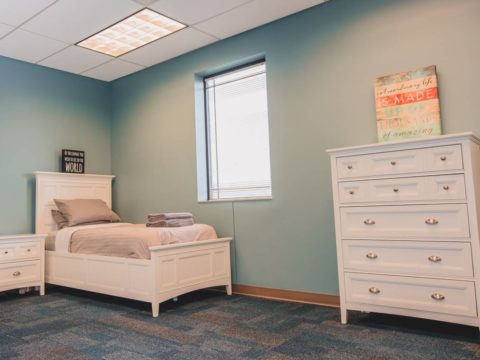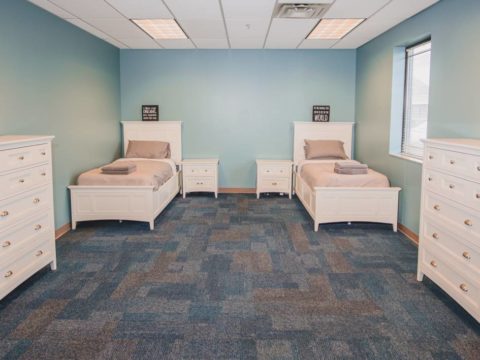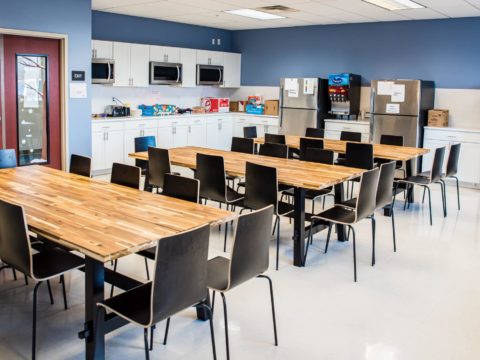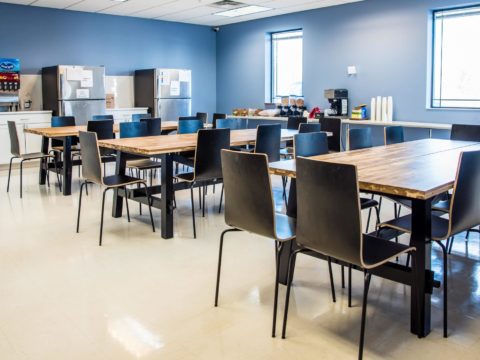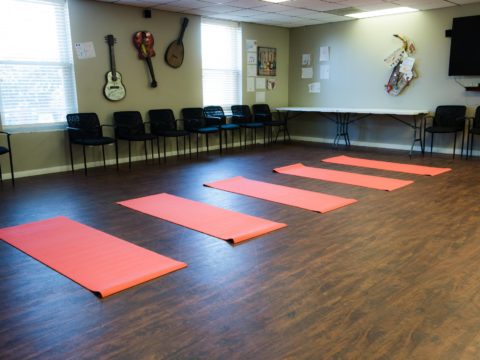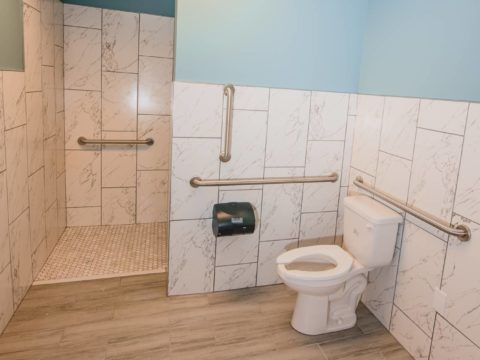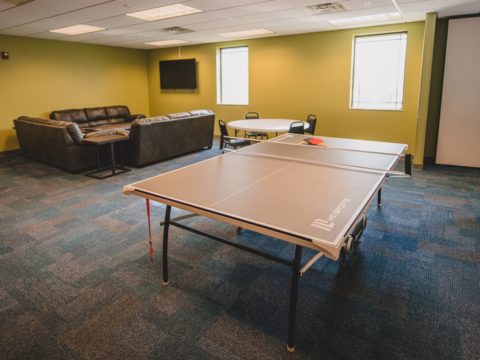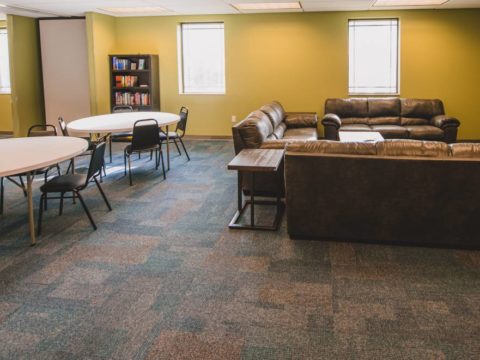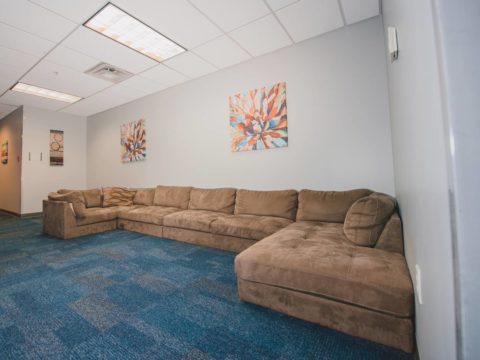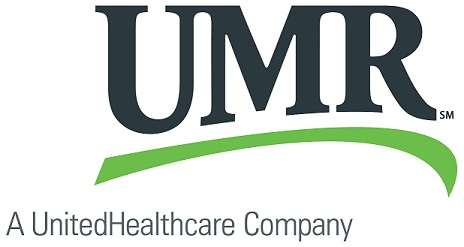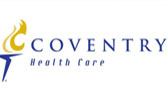Inpatient Rehab in Columbus At Ohio Addiction Recovery Center
Best Rated Inpatient Rehab in Ohio

Your health insurance could cover up to 100% of the cost of treatment. We’re happy to include the following amenities and services to call clients:
Primary Rehab Amenities and Services:
Ready to get help or have more questions? An addiction advisor is standing by.
What is Inpatient Drug & Alcohol Rehab?
-
What is Inpatient Rehab?
Residential or inpatient addiction treatment is a comprehensive and intensive high-level of care where clients live and sleep at the facility for the duration of their treatment.
Our residential rehab center offers a comfortable and residential environment that feels less “medical” than a hospital. However, like a hospital, you’ll still receive around-the-clock care from specialized medical staff such as nurses, physicians, and clinicians.
“Inpatient” and “residential” are terms often used interchangeably, but really the term “inpatient” is typically used to refer to short-term medical treatments, while “residential” is typically used to refer to long-term programs that are 30 days or longer.
Residential rehab is best for individuals who use drugs or alcohol consistently and find they cannot quit on their own. Residential treatment enables individuals to achieve the critical first 30-45 days of sobriety in a recovery-oriented environment.
Many studies suggest long-term residential programs are the most effective treatment model for producing sustained abstinence and recovery. That’s why we often encourage a phased approach that starts with inpatient detox, then residential treatment, and finally outpatient aftercare.
-
Residential Rehab at OARC Columbus
Residential treatment provides education, life skills, coping skills, psychotherapy, and medical care. Like Maslow’s hierarchy of needs, we believe individuals are most likely to recover when their physiological, safety, belonging, self-esteem, and cognitive needs are met. This is often referred to as a holistic approach.
At OARC, our residential drug & alcohol program includes the following:
- Assessment and Intake: The journey in residential addiction treatment begins with a thorough assessment of the individual’s physical and mental health, as well as their substance abuse history. We first conduct a pre-assessment over the phone which takes about 15-20 minutes to be sure you or a loved one are a fit for our program. If accepted for admission, you or your loved one will then receive a thorough bio-psycho-social assessment from our medical staff. This assessment helps the treatment team develop a personalized treatment plan tailored to the individual’s specific needs.
- Detoxification: For many individuals struggling with addiction, the first step of residential treatment involves detoxification. During this stage, individuals are medically supervised as they go through withdrawal, managing the physical and psychological symptoms of stopping substance use. Medical professionals provide medications and therapies to alleviate withdrawal symptoms and ensure the individual’s safety and comfort.
- Therapy and Counseling: Residential treatment programs offer a variety of evidence-based therapies, including cognitive-behavioral therapy (CBT), dialectical behavior therapy (DBT), individual counseling, group therapy sessions, and family therapy. These therapies help individuals address the root causes of their addiction, learn coping strategies, and develop healthier thought patterns and behaviors.
- Supportive Environment: In addition to 24-hour medical support, one of the significant advantages of residential treatment is the supportive environment it provides. Being surrounded by individuals who are going through similar struggles creates a sense of camaraderie and understanding. Peer support is a crucial aspect of the recovery process, and our residential program fosters a sense of community among residents. Most of our staff are also in recovery themselves.
- Skill Building & Education: In addition to therapy, individuals in residential treatment learn various life skills necessary for maintaining sobriety. These skills may include stress management, communication skills, time management, and problem-solving techniques. Learning these skills equips individuals with the tools they need to handle challenges and triggers in their everyday lives without resorting to substance use.
- Holistic Approach: Our residential treatment program incorporates holistic approaches to promote overall well-being. This includes activities such as yoga, outdoor walks, meditation, art therapy, and adventure therapy. These holistic practices help individuals reconnect with their bodies and minds, fostering a sense of balance and inner peace.
- Dual Diagnosis Treatment: Many individuals with addiction also struggle with co-occurring mental health disorders such as depression, anxiety, or PTSD. Our program specializes in dual diagnosis treatment, addressing both the addiction and the underlying mental health issues concurrently. Integrated treatment plans are essential for long-term recovery and our clients have the opportunity to regularly meet with our psychiatrist.
- Aftercare Planning: As the inpatient treatment program nears its end, the focus shifts to aftercare planning. A comprehensive aftercare plan is crucial for maintaining sobriety after leaving the facility. This plan may include outpatient therapy, support group meetings (such as Alcoholics Anonymous or Narcotics Anonymous), continued counseling, and ongoing medical support if necessary.
- Family Involvement: Our residential treatment program recognizes the importance of family support in the recovery process. We offer family therapy sessions and educational programs to help family members understand addiction, learn how to support their loved one’s recovery, and address any family dynamics that may contribute to the addiction.
Have more questions about our program and its offerings? Give us a call today at 800-481-8457.
-
How Much Does Inpatient Rehab Cost in Columbus?
Because inpatient rehab includes room & board for over 30 days, specialized clinical services, medications, labs, and 24-hour nursing care, rehabs in Ohio can cost tens of thousands of dollars without insurance. Fortunately, thanks to federal law, insurance providers are required to include addiction treatment services as part of essential health benefits, including government-sponsored insurance plans. That means for most individuals, most or all of their inpatient rehab stay will be covered by their insurance provider.
For those with commercial insurance policies, such as employment insurance plans, you will have a greater selection of treatment options. However, inpatient rehab may require some out-of-pocket costs similar to other healthcare services, such as co-pays, deductibles, or co-insurance, depending on the specifics of your policy.
Some private insurance plans may cover inpatient rehab 100%. For example, those who have already satisfied their annual deductible often find little to no out-of-pocket costs for inpatient rehab.
Curious what your insurance plan will cover? Check your benefits with us to find out.
-
Is Rehab Right For Me or Loved One?
Inpatient residential rehab might be right for you or a loved one if one or more of the following are true:
- Substance abuse is negatively affecting your home & family life
- Substance use is negatively affecting your career
- Substance use is negatively affecting your health
- You try to moderate drug or alcohol use and find you cannot
- You try to quit drug or alcohol use and find you cannot
- You experience withdrawal symptoms
- You constantly think or obsess about drugs or alcohol
- You feel as though drug or alcohol use is self-medication for an underlying mental health condition
- You feel as though you use drugs or alcohol to “cope” with life
-
Type of Addictions We Treat
Our inpatient rehab facility in Columbus, Ohio specializes in both specific substances and co-occurring mental health conditions, such as depression and anxiety. Specifically, our facility treats addictions such as:
- Alcohol use disorder
- Benzodiazepines, such as Klonopin, Valium, and Xanax
- Heroin, fentanyl, and other opioids
- Prescription drug abuse
- Tranquilizers and sedatives
- Methamphetamine
- Cocaine
- Adderall or other stimulants
-
Transportation Service Area
For those who qualify for our program, we offer transportation to and from our facility within driving distance. Sometimes, this is as far as Indiana, Michigan, West Virginia, or Pennsylvania. However, most of our clients are from Cleveland, Cincinnati, or Columbus and surrounding Central Ohio suburbs, such as Dublin, New Albany, Worthington, Powell, Delaware, and more. Give us a call today to verify insurance and take a short assessment to see if you are a fit for our program. If so, we would be more than happy to arrange transportation 800-481-8457.
-
What Comes After Inpatient Rehab?
At OARC, we highly encourage a phased approach. This means residential treatment is but one phase of our continuum of care. Our next levels of care include:
1. Partial Hospitalization
Our partial hospitalization program, also known as PHP, is an intensive level of care that is a phase below inpatient residential treatment. In PHP, clients sleep at home or in a transitional sober living home instead of the facility. During the day, clients receive much of the same treatment services and therapy they would receive in residential rehab.
Not all clients step down to PHP. Some will simply step down to IOP from residential treatment.
2. Intensive Outpatient
Our intensive outpatient program, also known as IOP, is a phase below PHP. In IOP, clients resume work or school while still receiving treatment. The intensive outpatient program at OARC is 6 weeks long and 3 days per week with 3-hour sessions per day.
3. Outpatient Counseling
After graduating IOP, many clients choose to continue outpatient counseling. This is often 1-hour per week, but clients typically choose a cadence that works best between them and their therapist.
4. Transitional Housing
For clients in PHP, IOP, or any other outpatient we highly encourage sober living, which is a type of structured transitional housing. Unlike inpatient rehab, clients in sober living are free to leave and work as they wish, provided they follow house rules and submit to random drug and alcohol screening. Sober living can provide much-needed accountability and peer support in the critical first year of recovery.
Unsure what level of care is right for you or a loved one? Call today for no-obligation assessment 800-481-8457.
Types of Drug and Alcohol Rehab Programs At Ohio Addiction Recovery Center
Evidence-Based Therapies and Research
At our inpatient rehab in Ohio, everything we do is rooted in evidence-based treatment because recovery deserves more than just hope. It deserves a plan that works. Every therapy we offer is backed by research, trusted by leading organizations in the field of addiction science, and delivered with a human touch.
These are not just checkboxes or clinical buzzwords. They are the tools people use to rebuild their lives, and we have seen firsthand how powerful they can be.
Why Evidence-Based Care Matters
When someone walks through our doors, they are not just looking for safety; they are looking for something that works. The Substance Abuse and Mental Health Services Administration (SAMHSA) emphasizes that evidence-based treatment leads to stronger, longer-lasting recovery outcomes. It helps people not only get through detox but also build the skills and emotional resilience to stay in recovery for the long term.
Core Therapies That Make a Difference
We customize every treatment plan to the individual, but many of our most effective therapies are grounded in decades of clinical research and experience:
-
- Cognitive Behavioral Therapy (CBT): Helps individuals identify and reframe thought patterns that lead to substance use. Backed by the National Institute on Drug Abuse (NIDA), it is a cornerstone of effective relapse prevention.
-
- Motivational Interviewing (MI): Supports clients in working through mixed feelings about change and helps build motivation, especially in early recovery. Recognized by SAMHSA as a best practice for engaging treatment-resistant individuals.
-
- Dialectical Behavior Therapy (DBT): Addresses both addiction and co-occurring mental health challenges. A 2023 meta-analysis in Addiction Science & Clinical Practice found it effective in reducing substance use and improving emotional regulation.
-
- 12-Step Facilitation Therapy: Encourages connection, accountability, and long-term engagement. According to the NIAAA, it supports lasting abstinence by encouraging participation in peer support groups like AA (Alcoholics Anonymous).
Why Inpatient Care Works
Inpatient treatment offers the structure and consistency often needed for individuals with moderate to severe addiction or for those who have experienced relapse. A 2023 study found that participants in inpatient programs had higher abstinence rates and better mental health outcomes six to twelve months later compared to outpatient-only care.
NIDA also recommends a minimum of 90 days in structured treatment for the best chance at lasting recovery. At OARC, that journey often begins with residential care and continues through our full continuum of support.
The OARC Approach: Where Science Meets Compassion
We bring these therapies to life through real relationships and personalized attention. Every member of our team, from therapists to support staff, is trained in trauma-informed care and understands that recovery is not just clinical; it is deeply personal.
We rely on evidence-based methods, but we also listen closely to the individual in front of us. The most effective approach is the one that works for you.
What Are the Objectives of Inpatient Rehabilitation Centers in Ohio?
The purpose of inpatient rehab in Ohio goes beyond helping someone stop using drugs or alcohol. The real goal is to give each person the tools, support, and structure they need to build a lasting recovery. At Ohio Addiction Recovery Center, our inpatient program is designed to help individuals:
- Stabilize in a safe environment with 24/7 medical supervision and emotional support.
- Work through the root causes of addiction with evidence-based therapies and counseling.
- Develop healthier coping skills that replace old habits and reduce the risk of relapse.
- Strengthen relationships by involving family and loved ones in the healing process.
- Build confidence and independence through structured routines, life skills training, and relapse prevention planning.
By addressing both the physical and emotional sides of addiction, inpatient rehab creates a foundation for long-term success. Recovery is not just about getting sober. It is about learning how to live a healthier, more fulfilling life.
What People Say
About Us
Call Now to Begin Rehab in Ohio
Reaching out for help is one of the courageous things you can do. Do not wait another day to address your addiction. Call Ohio Addiction Recovery Center toll-free today at 800-481-8457 and speak to one of our experienced admissions coordinators. Our team is here to guide you through every step, answer your questions, and help you find the right rehab in Ohio for your needs. All calls are completely confidential and free of charge. A better life is within reach, and it may be only one phone call away.


